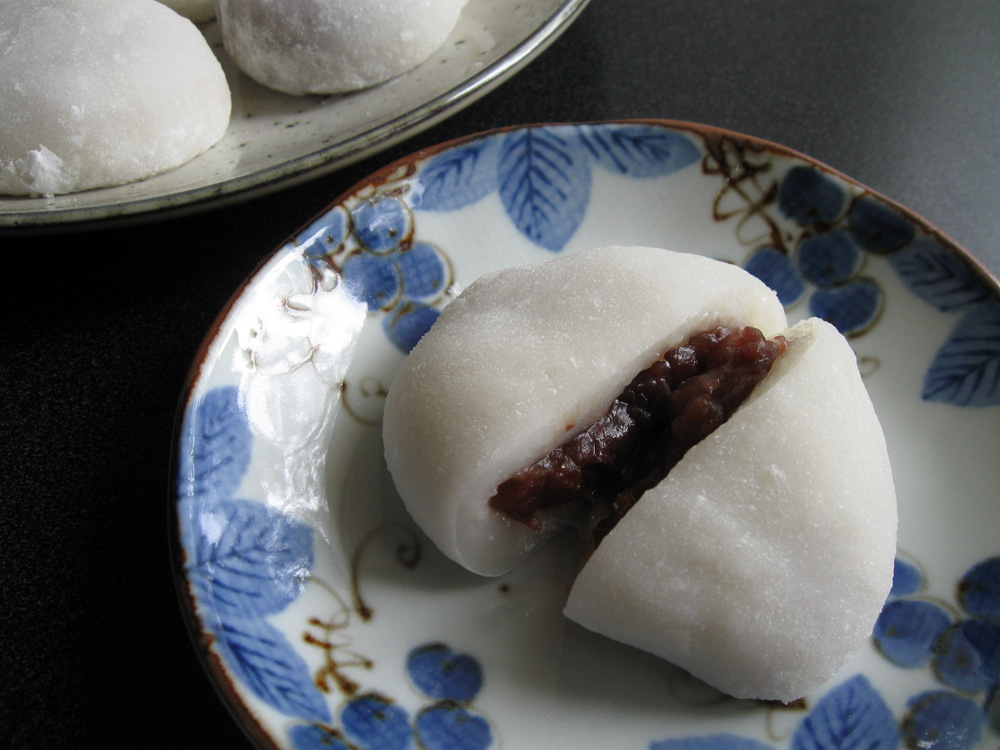

The process usually involved two people, one’s job was to ground the rice with kine while the other turned the mochi and periodically added water to it. Not bad for the first time! Next time I will experiment with white bean paste as well as sweetened chestnut.Traditionally, Japanese mochi was made by pounding steamed rice into a smooth, glutinous paste using a wooden pestle - kine - and a stone mortar - usu. The texture of the paste was significantly better and after 2 minutes in the microwave, the mochi had the best texture and was the easiest batch for me to work with.Īlthough not the prettiest ones around, they were mighty tasty. I made a green tea batch next, added more water and microwave for 2 minutes exactly, turned out pretty good! The last batch I made was pink, I have added 2/3 cup of water + 2 Tbsp more.

Here is a picture of the paste prior to microwaving.

The resulting mochi was a bit tougher and drier to work with, difficult to pinch the ends together. I suspected that either the mixture was too dry or needed to be microwave longer. I started out with a batch of the white colored mochis. Dust the Green tea mochis in kinako flour (add a tsp of powdered sugar to the flour for sweetness). Dust the white and pink mochis in a mixture that is half cornstarch and half powdered sugar. For the pink mochis: Mix the strawberry with red bean paste, then follow the rest of step 5.Ħ. Use both hands to help mold the mochi into a ball if the shape has become irregular in the process. Then carefully lift the edges of the mochi up over the red bean paste and pinch them together to completely encase it. For white and green tea mochis: Place 2 tablespoons of red bean paste into the center of the flattened disc. Sprinkle a bit of cornstarch onto your hands or into the mochi if things are getting sticky.ĥ. Ideally you want the outer edge to be slightly thinner than the center of your flattened disc, as the edges will soon be pinched together to form your ball. Using both palms and the pads of your fingers, flatten the mochi into a circle about 3-4 inches in diameter. Cut the mochi in half, then each half into thirds to make 6 pieces.Ĥ. Coat your hands with cornstarch and knead the mochi to work out any lumps. Empty the ball of mochi on to the cornstarched surface, it will be HOT so use a spatula if you need to. The perfect mochi is smooth, sticky and soft, but not overly wet.ģ. If it’s starting to set, give it a quick swirl and put it back in the microwave for another 30 seconds. Microwave the mixture on high for 1-2 minutes. If the mixture is too dry, add a little more water. (add green tea powder or red food coloring here if you are making green or pink ones.) Mix until smooth. Combine sweet rice flour, sugar, and water in a microwave safe bowl. Sprinkle cornstarch generously on your counter top.Ģ. Optional: Kinako Powder (toasted soy bean flour)ġ. Optional: 5-6 Strawberries, diced (for pink mochis) For pink color, add 1 drop of red food coloring. For green color, add 1 tsp green tea powder – 1 cup cornstarch (for countertop and your hands) – about 3/4 cup of red bean paste (2 tbsps per mochi) – 1 cup sweet rice flour (I used the Mochiko brand) Turned out equally delicious! Here is a slightly shortened recipe and directions from Globetrotter Diaries. Instead of using persimmons, I used strawberries to make “Ichigo Daifuku”, but since I know I don’t have the chops to wrap the whole strawberry inside without breaking the mochi, I chopped them up and mixed with the red bean paste first. They have beautiful pictures and detailed instructions so I didn’t feel the need to take the step-by-step pictures. I used the recipe posted from Globetrotter Diaries. I like anko chunky with skins on, but it really doesn’t affect the taste too much. A quick search online for anko recipes and you will find that there are different types of anko, some with skins on, some without. It’s pretty easy and straight forward to make your own if you can’t find the paste in your grocery store’s ethnic aisle, just boil the beans, and sweeten the paste with sugar. The problem with store bought paste is that it’s usually too sweet, and the texture is more wet and not as dense, makes it more difficult to fill the mochis. They are usually filled with sweetened red or white bean paste, I often have cans of red bean paste (aka “anko”) on hand so I didn’t bother to make my own. (See: Fried Pumpkin Mochi Stuffed with Azuki Paste)įor our ramen dinner, I thought some daifuku mochi would be fitting with the Japanese theme. I grew up eating both sweet and savory treats made with glutinous rice flour, but it isn’t until recently that I started experimenting with both glutinous rice and flour and make something delicious with it.


 0 kommentar(er)
0 kommentar(er)
